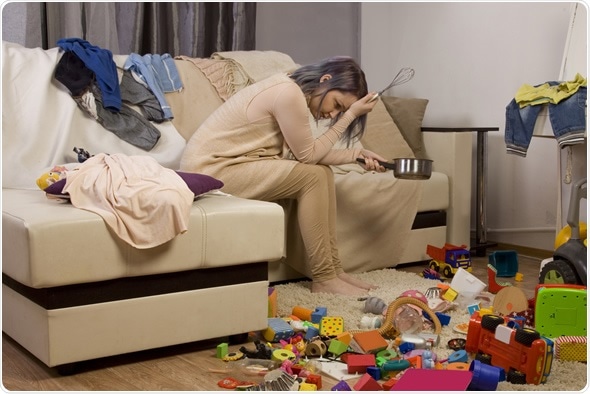Depression is a relatively frequent complication of pregnancy and the postpartum period, when it is called antenatal and postnatal depression, respectively. It occurs in roughly 13 of every hundred women who are pregnant or have recently given birth. However, many women who are depressed around this time may not realize it because they attribute the changes in their feelings and moods to the physical, hormonal, and physiological alterations that accompany this dramatic life event.

Image Copyright: Tatyana Dzemileva / Shutterstock
Some of the symptoms which should alert you to the possibility of depression include:
- Mood swings
- Feelings of dejection or being overwhelmed
- Crying spells
- Lack of interest in life
- Sleep disturbances
- Changes in appetite and eating patterns
- Lack of concentration and difficulty with making decisions
- Social withdrawal
- Physical symptoms without an identifiable cause
How do you Measure your Risk?
About 78 to 83 percent of antenatal stress is due to the following factors. People who have these risk factors, and several of the above symptoms, should consider the possibility of depression:
- Poor self-esteem
- Excessive or repeated anxious thoughts about the baby and pregnancy
- Poor or missing social and family support
- Negative response to life events
- Life events which produce stress and/or pain, such as death of a close friend or family member, increased family responsibilities such as those of a caregiver for another family member
- Present or past abuse
- Financial stress
- Young age
- Low education
- Family history of depression
- History of depression previously
- Stopping antidepressant medication prematurely
Other significant risk factors include:
- Depression of the other partner
- History of difficult pregnancy or delivery
- Marital stress
- Unwelcome or unplanned pregnancy
- Substance abuse
What Links Postnatal to Antenatal Depression?
Biological Changes
Women experience a lot of hormonal fluctuations throughout pregnancy and in the immediate postpartum period. These include estrogen and progesterone, as well as prolactin, and the thyroid hormone. Research also shows dramatic changes in brain structure and function which affects female moods and coping skills. Emotional swings and mood changes are linked to these changes. This factor may contribute to the risk of depression at other times during the female reproductive cycle, such as puberty, menstruation, the antenatal period, and around the time of menopause.
Men also show some hormonal variations during the pregnancy of their partner, and after the birth of the child. These include lowering of testosterone levels, which is responsible for decreased aggression levels and increased bonding with the baby, according to some researchers. However, excessive drops in the level of testosterone are linked to depression in men.
Coexisting Psychological Conditions
Again, parenting may produce or worsen already existing depressive symptoms in the parent’s life. This may arise as a result of parenting stress.
Contributing factors include:
- Fatigue following childbirth
- Lack of sleep
- Very much increased responsibilities in terms of baby care, especially for mothers
- Emotional factors such as self-doubt and low self-esteem
- Unpredictable schedules
- Fear of expressing stress, resentment, anger, or discontentment about child-raising for fear of what others may think about the person as a parent
- Loss of intimacy with the partner, and especially, the failure to return to previous patterns of sexual frequency and interest
Antenatal and Postnatal Depression
Postnatal depression is largely associated with the following factors which account for 66 to 82 percent of variance:
- Antenatal depression is the single most important mediator of postnatal depression in many large studies. Its action is linked with the seven primary risk factors which predict its occurrence, namely, reduced self-esteem, anxiety during pregnancy, impaired support by family or friends, a negative style of cognitive response, any important life change, poverty or financial stress, and a history of abuse.
- A history of depression
- Stress in looking after the child coexisting with postnatal depression. This difficulty in childraising lasted to up to 42 months postpartum
- Birth of a female child in developing countries
- Lack of assurance that the course of the delivery was optimal, and dissatisfaction with the quality of care
- Age is also an important factor in predicting the onset of postnatal depression.
References
Further Reading
Last Updated: Dec 18, 2019